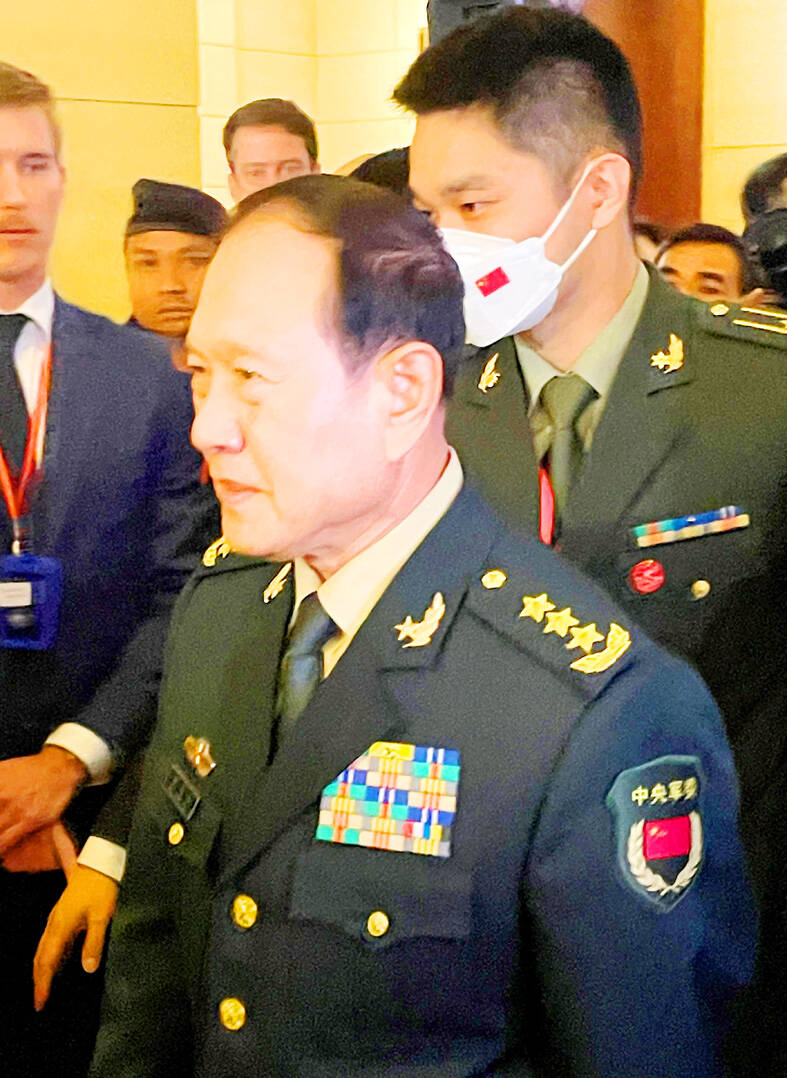The US’ and China’s top defense officials yesterday held talks on the sidelines of a regional meeting in Cambodia to discuss strained bilateral relations, and regional and global security issues.
It was the second face-to-face meeting in six months between US Secretary of Defense Lloyd Austin and Chinese Minister of National Defense General Wei Fenghe (魏鳳和).
Pentagon Press Secretary Brigadier General Pat Ryder said that Austin assured Wei of US President Joe Biden’s commitment to the “one China” policy.

Photo: AFP
Austin “underscored his opposition to unilateral changes to the status quo” in the Taiwan Strait and called on China to refrain from destabilizing actions toward Taiwan, Ryder said in a statement.
He also urged continuing talks on “reducing strategic risk, improving crisis communications, and enhancing operational safety,” noting concerns about “dangerous behavior” by Chinese military aircraft “that increases the risk of an accident,” Ryder said.
At a news conference, Chinese defense ministry spokesman Senior Colonel Tan Kefei (譚克非) described the talks “as a concrete measure to implement the important consensus reached between [Chinese President] Xi [Jinping, 習近平] and Biden.”
The meeting was “of great significance” for bringing China-US relations “back to the track of healthy and stable development,” Tan said.
However, a statement issued by the ministry quoted Wei as saying: “The responsibility for the current situation facing China-US relations is on the US side, not on the Chinese side.”
Wei said the issue of Taiwan was a “red line” over which China would brook no foreign interference.
China’s military “has the backbone, the determination, the confidence and the ability to resolutely safeguard the unity of the motherland,” Wei said.
The ministry’s statement said that the two officials also exchanged views on the South China Sea, Ukraine and the Korean Peninsula, without giving details.
The US statement said that Austin discussed Russia’s war in Ukraine, and noted that Washington and Beijing “oppose the use of nuclear weapons or threats to use them.”
The meeting came just over a week after a meeting in Indonesia between Biden and Xi, which was widely seen as an effort to ease tensions between the two superpowers over trade and China’s actions in the Taiwan Strait.
Austin and Wei were in Siem Reap, Cambodia, attending a meeting of APEC and other defense ministers.

COMBINING FORCES: The 66th Marine Brigade would support the 202nd Military Police Command in its defense of Taipei against ‘decapitation strikes,’ a source said The Marine Corps has deployed more than 100 soldiers and officers of the 66th Marine Brigade to Taipei International Airport (Songshan airport) as part of an effort to bolster defenses around the capital, a source with knowledge of the matter said yesterday. Two weeks ago, a military source said that the Ministry of National Defense ordered the Marine Corps to increase soldier deployments in the Taipei area. The 66th Marine Brigade has been tasked with protecting key areas in Taipei, with the 202nd Military Police Command also continuing to defend the capital. That came after a 2017 decision by the ministry to station

‘INVESTMENT’: Rubio and Arevalo said they discussed the value of democracy, and Rubio thanked the president for Guatemala’s strong diplomatic relationship with Taiwan Guatemalan President Bernardo Arevalo met with US Secretary of State Marco Rubio in Guatemala City on Wednesday where they signed a deal for Guatemala to accept migrants deported from the US, while Rubio commended Guatemala for its support for Taiwan and said the US would do all it can to facilitate greater Taiwanese investment in Guatemala. Under the migrant agreement announced by Arevalo, the deportees would be returned to their home countries at US expense. It is the second deportation deal that Rubio has reached during a Central America trip that has been focused mainly on immigration. Arevalo said his

‘SOVEREIGN AI’: As of Nov. 19 last year, Taiwan was globally ranked No. 11 for having computing power of 103 petaflops. The governments wants to achieve 1,200 by 2029 The government would intensify efforts to bolster its “Sovereign Artificial Intelligence [AI]” program by setting a goal of elevating the nation’s collective computing power in the public and private sectors to 1,200 peta floating points per second (petaflops) by 2029, the Executive Yuan said yesterday. The goal was set to fulfill President William Lai’s (賴清德) vision of turning Taiwan into an “AI island.” Sovereign AI refers to a nation’s capabilities to produce AI using its own infrastructure, data, workforce and business networks. One petaflop allows 1 trillion calculations per second. As of Nov. 19 last year, Taiwan was globally ranked No. 11 for

Israel yesterday said it has begun preparations for the departure of large numbers of Palestinians from the Gaza Strip in line with US President Donald Trump’s plan for the territory, while Egypt has launched a diplomatic blitz behind the scenes to try and head off the plan. The Trump administration has already dialed back aspects of the proposal after it was widely rejected internationally, saying the relocation of Palestinians would be temporary. US officials have provided few details about how or when the plan would be carried out. Trump yesterday said that Israel would turn Gaza over to the US after the